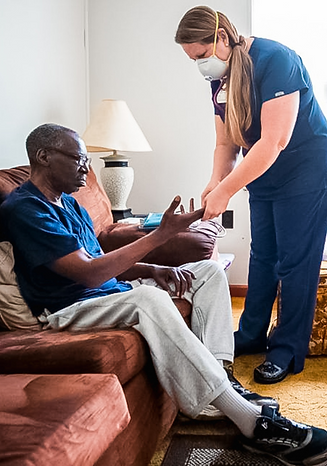
FEDERAL ISSUES
Crippled by funding cuts, historic inflation, government red tape, and an harmful regulations, American families across the country who rely on home care and hospice services are being left behind by our federal lawmakers. Congress must act, protecting patients and recognizing the vital work home care nurses, therapists, aides and the entire industry provides, so millions of Americans can continue receiving the comfortable, compassionate care they deserve.
ISSUES
FUNDING
For many Americans, home health is the only option to meet their care needs, and a strong home care and hospice industry is vital to supporting our healthcare system as a whole. Unfortunately, Medicare rate reductions are threatening this care, and will end up costing American taxpayers even more.
Home health is much more cost-effective for long-term care, saving Medicare billions and making the industry a valuable piece of the healthcare puzzle for reducing rising health care costs.
To support home care and hospice for every American family who needs it, TAHCH urges federal leaders to:
-
Ensure adequate reimbursement rates for Medicare home health services and hospice.
-
Support federal legislation, like the Preserving Access to Home Health Act of 2023, that benefits the industry and its patients.
-
Provide immediate relief to rural home health providers that are facing increased costs following the pandemic and historic inflation.
Tell your Representatives in Congress that the home care and hospice industry needs bold solutions to save the care millions of American families rely on.


REGULATORY BURDENS
Home care patients need access to care now, but with more regulatory hurdles and a healthcare industry that grows more challenging by the day, burdensome regulations can often impact accessibility to care.
Additional burdens for home health will further challenge an industry that has continued to overcome challenges in order to serve our patients’ needs. Now, home care and hospice providers need regulators to:
-
Increase cost-saving telehealth options for patients, when appropriate.
-
Simplify the claims auditing process, limiting administrative burdens and allowing providers to focus on patients.
Urge regulators to remove hurdles to care for home care patients in need.
WORKFORCE
Recently, U.S. Surgeon General Dr. Vivek Murthy issued an advisory highlighting the urgent need to address health worker burnout, affecting the entire healthcare industry and “placing our nation’s health at risk.” Home care agencies are especially feeling this strain, unable to compete with high-paying salaries and bonuses provided at hospitals.
In order to address this ongoing crisis, TAHCH needs federal lawmakers to:
-
Support a well-qualified and reliable home care workforce.
-
Prioritize home care workers as part of the larger health care landscape.
Let Congress know why home care workers need our support.


Hospice Special Focus Program (SFP)
The hospice industry supports the concept of a Special Focus Program (SFP) to identify hospices that are struggling to provide quality care and place those providers under increased oversight. Unfortunately, as it is currently written, the SFP diminishes the program’s effectiveness by:
-
Inaccurately identifying hospices as delivering substandard care.
-
Unfairly scrutinizing hospices that take care of large numbers of patients.
-
Disincentivizing the reporting of accurate data.
Because of these issues, a multi-state coalition of hospices and hospice associations is challenging the Centers for Medicare & Medicaid Services’ (CMS) Hospice Special Focus Program (SFP) Final Rule and its implementation as unlawful and arbitrary. The plaintiffs seek a preliminary injunction to halt the Special Focus Program, which as CMS is implementing it, undermines patient safety, misrepresents hospice compliance records, and jeopardizes access to high-quality end-of-life care.

vetERanS
affairs
The Veterans Affairs (VA) Community Care Program currently reflects inconsistencies that contribute to unequal access to home care services for veterans. The variability in Care Coordination (CC) using Standardized Episodes of Care (SEOC) results in inequitable access to medically necessary services. Care Coordinators, who are non-medical providers, frequently utilize a Case Mix Index (CMI) assessment after a SEOC has been generated, which can lead to reductions in the level of services provided to veterans. This approach grants Care Coordinators excessive authority over care modifications, which may undermine clinical decisions.
Additionally, medical providers who initiate services through the SEOC process may encounter denials or modifications to their orders by Care Coordinators, affecting the continuum of care.
To ensure appropriate, timely, and high-quality in-home care for all veterans, the home care community supports the following actions:
-
Establish a national standard for the application of SEOC to eliminate regional inconsistencies and ensure equitable access to medically necessary services for all veterans.
-
Prohibit post-SEOC CMI assessments that reduce or alter the level of services authorized by medical providers.
-
Protect the integrity of clinical decision-making by ensuring that only licensed medical providers have the authority to initiate, modify, or discontinue care under the SEOC process.
By implementing these steps, the Department of Veterans Affairs can ensure that the SEOC is applied consistently and without subsequent modification—guaranteeing that veterans receive appropriate, timely, and high-quality in-home care, regardless of their location or Care Coordinator assignment.



.png)